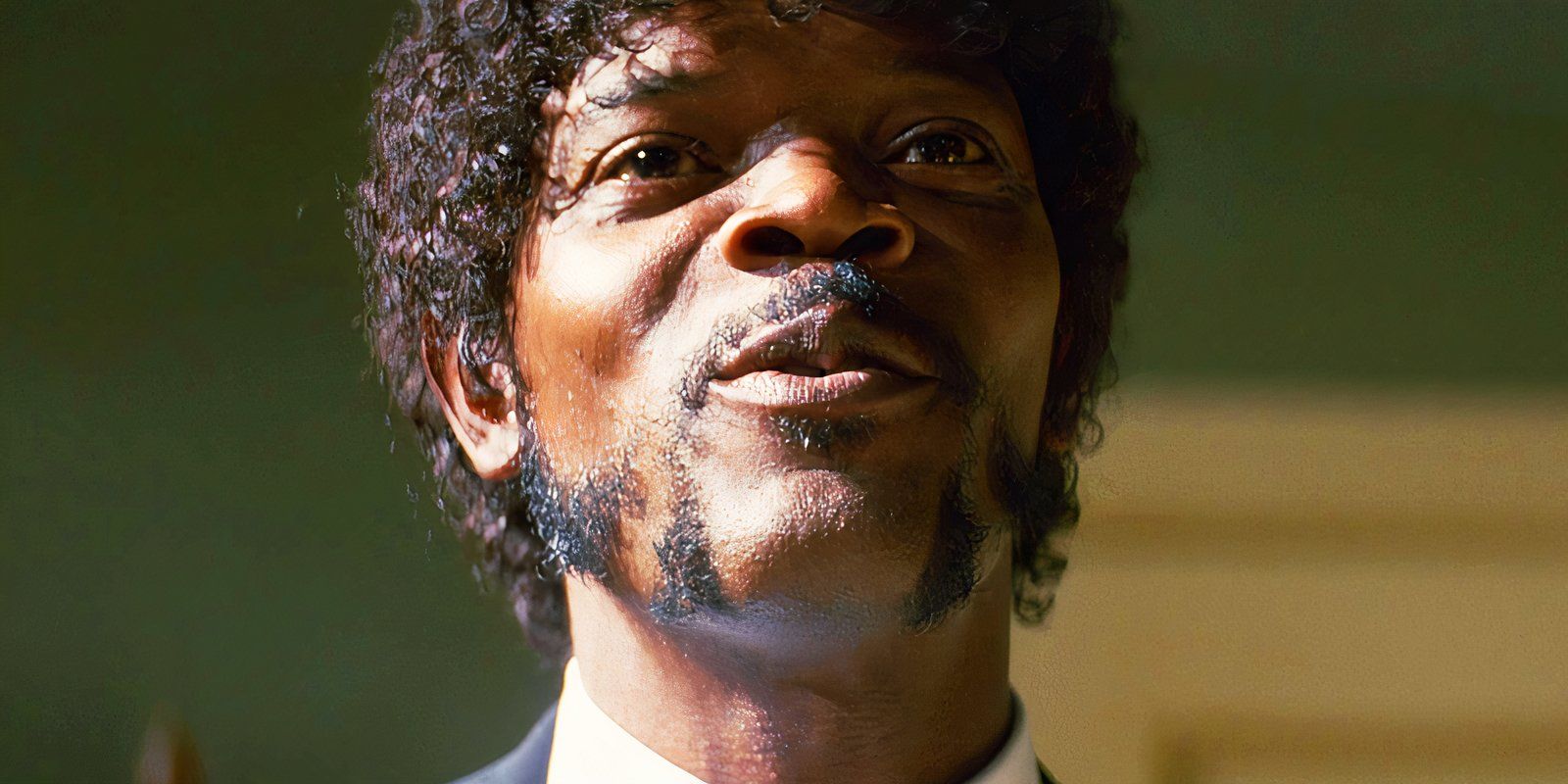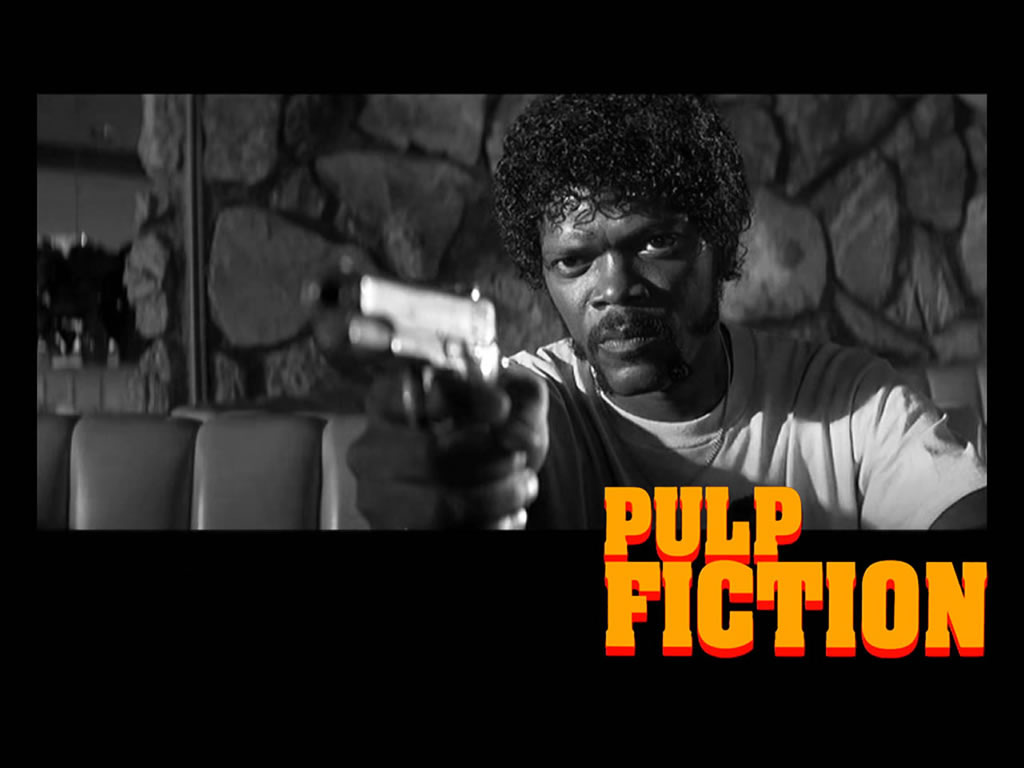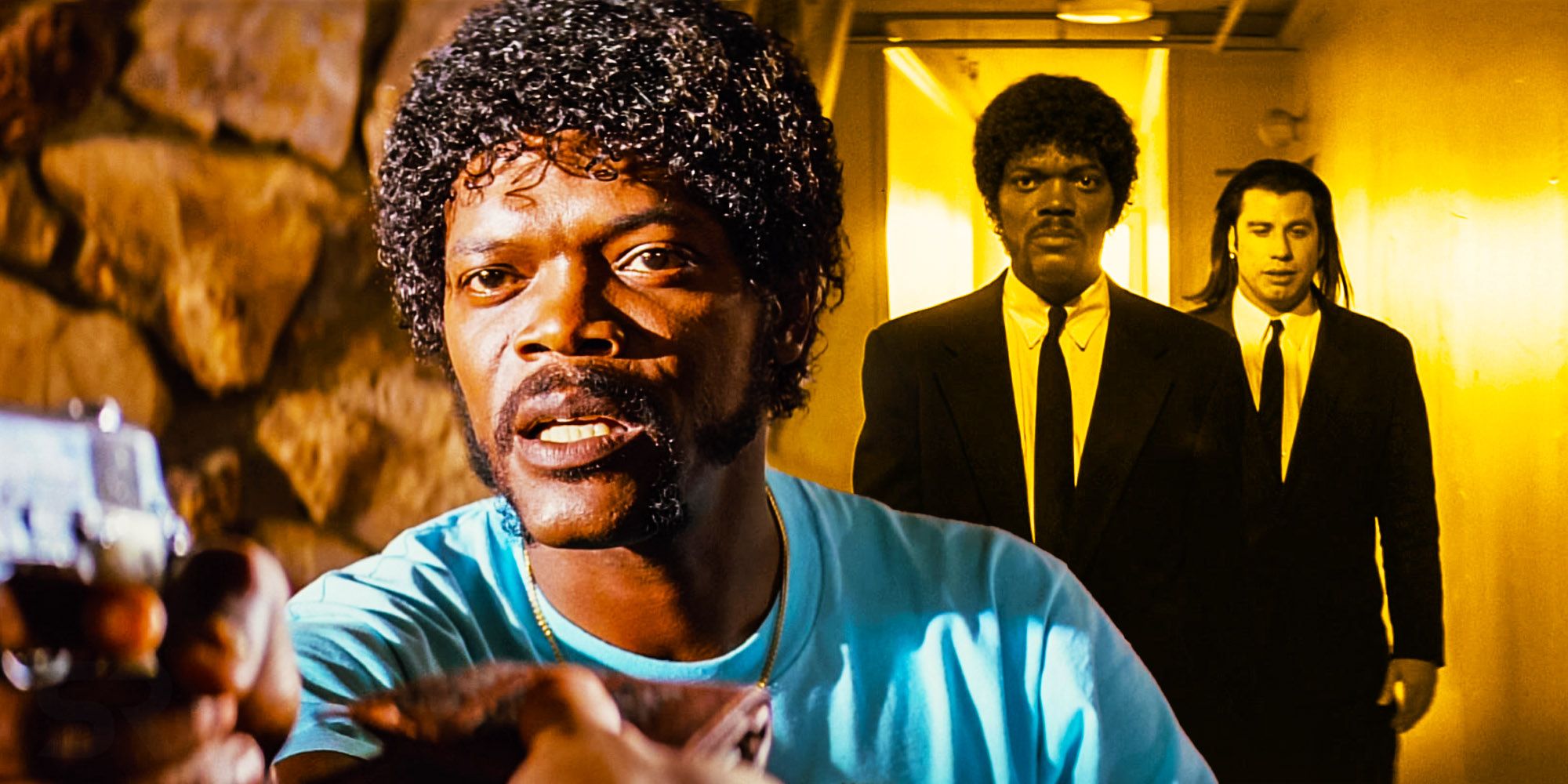Samuel L. Jackson's Pulp Fiction Speech: A 30-Year Legacy
The words echo, even after three decades. The famous `samuel l jackson pulp fiction speech`, a powerful monologue delivered by the incredible Samuel L. Jackson as Jules Winnfield, has truly cemented its place in film history. It's a moment that, for many of us, still sends a shiver down the spine, so very intense and thought-provoking.
This particular scene, which unfolds early in Quentin Tarantino's 1994 hit film *Pulp Fiction*, introduces us to Jules, a character who is, in a way, more than just a hitman. His intense and captivating monologue, which he recites before carrying out a grim task, offers a chilling glimpse into his mind and, too, his evolving perspective on life and justice. It’s a speech that, you know, just sticks with you.
As *Pulp Fiction* marks its 30th anniversary, there's been a lot of buzz around this very speech, with Samuel L. Jackson himself revisiting the unforgettable lines. We're going to explore what makes this performance so memorable, the story behind the words, and why this particular moment continues to resonate with audiences all these years later, in some respects.
- Benedict Cumberbatch Madagascar
- Tom Hiddleston Images
- Matthew Mcconaughey Interstellar Crying
- Clint Eastwood Full Name
- Hugh Jackman On Broadway
Table of Contents
- Samuel L. Jackson: A Glimpse into the Actor's Journey
- The Unforgettable Speech: Ezekiel 25:17
- The 30th Anniversary Celebration
- Why the Speech Still Resonates
- People Also Ask (FAQs)
- Final Thoughts on a Cinematic Masterpiece
Samuel L. Jackson: A Glimpse into the Actor's Journey
Before his unforgettable turn as Jules Winnfield, Samuel L. Jackson had already built a considerable body of work, appearing in various films and stage productions. Yet, it was his partnership with Quentin Tarantino, which really began to blossom with *Pulp Fiction*, that helped propel him into a whole new level of widespread recognition and, you know, appreciation. His ability to inhabit characters with such depth and a certain, well, presence, has always been clear.
He has this way of making every line, every gesture, feel incredibly genuine, which is that kind of magic actors strive for. His career, in a way, shows a steady climb, with each role adding to his reputation as a performer who truly commits. It's fascinating to see how his work before *Pulp Fiction* laid the groundwork for such a pivotal role, setting the stage for what was to come, more or less.
Personal Details & Biography
| Full Name | Samuel Leroy Jackson |
| Birthdate | December 21, 1948 |
| Birthplace | Washington, D.C., U.S. |
| Notable Role in Pulp Fiction | Jules Winnfield |
| Key Collaborator | Quentin Tarantino |
The Unforgettable Speech: Ezekiel 25:17
The `samuel l jackson pulp fiction speech` isn't just a collection of lines; it's a performance, a moment that defines a character and, arguably, a whole film. The passage, Ezekiel 25:17, is recited by Jules Winnfield with a chilling intensity right before he carries out an execution. It's a powerful scene that leaves a lasting impression, you know, long after the credits roll. The way Jackson delivers it, with such conviction, is just captivating.
- Al Pacino Heritage
- Christopher Walken Googly Eyes
- Gary Oldman On Stephen Colbert
- Christian Bale Fighter
- Jeff Bridges Grandchildren
This particular dialogue, featured as "track 20" on the film's music soundtrack, has become deeply embedded in popular culture. It's a speech that people often quote, sometimes seriously, sometimes playfully, but always with a nod to its original, potent context. The sheer power of the words, coupled with Jackson's delivery, makes it an enduring piece of cinematic art, that's for sure.
Jules Winnfield: The Man Behind the Words
Jules Winnfield is, in some respects, a truly complex figure. He's a hitman, yes, but he's also a man grappling with questions of morality, fate, and redemption. The Ezekiel 25:17 speech is not merely a pre-execution ritual for Jules; it's a window into his inner turmoil and, you know, his attempts to make sense of his violent life. He sees himself, at least initially, as the "tyranny of evil men," delivering righteous anger.
Over the course of the film, Jules experiences a profound shift, sparked by what he perceives as a miracle. This event leads him to reconsider his interpretation of the bible passage and, frankly, his entire existence. His journey from a cold-blooded killer to a man seeking a different path is, well, central to his appeal, and the speech acts as a kind of anchor for this transformation, more or less.
The words, "The path of the righteous man is beset on all sides by the inequities of the selfish and the tyranny of evil men," become a personal mantra for Jules, evolving in meaning as his character develops. He starts by believing he is the righteous man, then questions if he is the "shepherd" or the "tyranny of evil men" himself, which is a pretty big shift in perspective, actually.
Quentin Tarantino's Vision
Quentin Tarantino, the brilliant mind behind *Pulp Fiction*, crafted this speech to be both shocking and thought-provoking. While the passage itself is from the Bible, Tarantino put his unique spin on it, particularly the final lines that Jules adds, which are not part of the original scripture. This creative addition helps to solidify Jules' character and, you know, his distinct worldview.
Tarantino's direction of the scene is just as important as the words themselves. The close-ups on Jackson's face, the controlled intensity, and the sudden bursts of violence all work together to create a moment that is both terrifying and, in a way, deeply compelling. He really knows how to build suspense and, you know, make every second count, which is something that's quite special.
The director's choice to open the film with such a powerful and unconventional scene immediately sets the tone for *Pulp Fiction*. It signals to the audience that this isn't going to be a typical crime movie; it's going to be something different, something that makes you think and, perhaps, a little uncomfortable, too. This particular speech, in essence, is a cornerstone of the film's unique identity, that's for sure.
The Speech's Influence on Film and Culture
The `samuel l jackson pulp fiction speech` quickly transcended the film itself, becoming a cultural phenomenon. Its quotability, combined with Jackson's powerful performance, made it an instant classic. You hear references to it in other movies, TV shows, and even in everyday conversations, which is, you know, pretty cool to see. It just shows how much it resonated with people.
On platforms like YouTube, clips of the speech have garnered hundreds of thousands of views, with one particular instance noted as having 183.2k views, showing its enduring online popularity. This widespread sharing helps to keep the speech, and the film, relevant for new generations of viewers, ensuring its place in the collective consciousness, in a way. It's almost like a shared cultural touchstone.
Its influence extends beyond mere quotation; it has also inspired discussions about morality, vengeance, and the nature of good and evil. The ambiguity of Jules' interpretation of the passage invites viewers to consider their own perspectives, which is, well, a sign of truly great writing and acting. It's a speech that, in some respects, encourages deeper thought, which is something films don't always achieve.
The 30th Anniversary Celebration
As *Pulp Fiction* reached its 30-year milestone, fans and the cast alike have been celebrating this cinematic achievement. Samuel L. Jackson, a central figure in the film's success, has played a significant role in these anniversary festivities. It's a nice way to honor a movie that, you know, truly changed the game for many involved. He's been pretty active in acknowledging this special occasion, actually.
His continued connection to the role of Jules Winnfield is a testament to the character's lasting impact and, too, Jackson's own attachment to the film. It's clear that *Pulp Fiction* holds a special place in his heart, and he's more than happy to share that enthusiasm with the fans. This kind of ongoing engagement really adds to the film's legacy, in a way.
Samuel L. Jackson Recreates the Moment
To mark the 30th anniversary, Samuel L. Jackson posted a video to his social media, where he once again recited his infamous Ezekiel 25:17 speech from the film. This act delighted fans worldwide, showing that after more than three decades, he can still effortlessly deliver his character's famous lines. It's just incredible how he can still tap into that intense energy, you know, so completely.
He also stopped by popular talk shows, like *The Graham Norton Show*, to perform the speech, demonstrating his incredible talent and, too, his enduring connection to the material. These public recitations not only celebrate the film but also remind everyone of the sheer power of his original performance. It's a bit like a living piece of film history, being brought to life again and again, which is very cool.
Jackson himself has spoken about the film's significance, saying, "I knew this film was something." This personal insight from the actor adds another layer to the celebration, highlighting the unique feeling they had while making it. His willingness to revisit the speech, you know, really shows his appreciation for the film and its fans, which is quite nice.
The Speech's Enduring Popularity
The fact that the `samuel l jackson pulp fiction speech` continues to be a highlight of anniversary celebrations speaks volumes about its enduring popularity. It's not just a scene; it's a cultural touchstone that has resonated with multiple generations of filmgoers. People still talk about it, they quote it, and they revisit it, which is that kind of lasting appeal many films hope for, but rarely achieve.
Its appeal lies in its blend of biblical gravitas, street-level grit, and, well, Samuel L. Jackson's captivating performance. The way it weaves together deep philosophical questions with brutal action creates a unique tension that, frankly, few other scenes can match. It's a piece of cinema that, in a way, just gets under your skin and stays there, which is pretty amazing.
The speech's presence in discussions about the film's 30th anniversary highlights its central role in *Pulp Fiction*'s legacy. It's often one of the first things people remember or mention when discussing the movie, underscoring its impact and, you know, its lasting power. This kind of recognition, after so long, is truly something to celebrate, that's for sure.
Why the Speech Still Resonates
The `samuel l jackson pulp fiction speech` continues to hold a powerful sway over audiences for several key reasons. Firstly, there's the sheer force of Samuel L. Jackson's performance. His delivery is nothing short of mesmerizing, imbuing every word with a mix of menace, conviction, and, well, a touch of spiritual awakening. It's a masterclass in acting, honestly, and it just draws you right in.
Then, too, there's the content of the speech itself. While rooted in a biblical passage, its themes of judgment, redemption, and the nature of evil are universal. Jules' struggle to understand his place in the world, and whether he is an instrument of divine retribution or simply a man of violence, resonates deeply with viewers who grapple with similar questions in their own lives. It's a powerful narrative about finding a new path, in some respects.
Finally, the speech is expertly placed within the film's narrative. It serves as a pivotal moment for Jules, setting him on a path of introspection and change. This character development, fueled by such a powerful monologue, makes the scene not just memorable for its words but for its profound effect on one of cinema's most beloved characters. It's actually a pretty genius piece of storytelling, you know.
People Also Ask (FAQs)
What is the Samuel L. Jackson speech from Pulp Fiction?
The speech Samuel L. Jackson delivers in *Pulp Fiction* is a modified version of Ezekiel 25:17 from the Bible. His character, Jules Winnfield, recites it with intense conviction before executing people. The most quoted part includes lines like, "The path of the righteous man is beset on all sides by the inequities of the selfish and the tyranny of evil men." It's a moment that, you know, really sets a certain tone for the film.
Did Samuel L. Jackson write the Ezekiel 25:17 speech?
No, Samuel L. Jackson did not write the Ezekiel 25:17 speech for *Pulp Fiction*. The dialogue, including the specific interpretation and added lines, was written by the film's director and co-writer, Quentin Tarantino. Jackson delivered the lines with his unique, powerful style, which is, well, what makes it so memorable. Tarantino, you know, really crafted those words for Jules.
How old was Samuel L. Jackson when he filmed Pulp Fiction?
Samuel L. Jackson was about 45 years old when he filmed *Pulp Fiction* in 1993 (the film was released in 1994). He was born in December 1948, so he was in his mid-forties when he took on the role of Jules Winnfield, a performance that, you know, really helped define his career. It's amazing to think he was that age when he delivered such a fresh and, well, impactful performance.
Final Thoughts on a Cinematic Masterpiece
The `samuel l jackson pulp fiction speech` stands as a towering example of brilliant writing, masterful acting, and unforgettable cinema. It's a moment that continues to captivate and provoke thought, proving that some scenes simply transcend their original context to become cultural touchstones. Its enduring presence, especially with the 30th anniversary, really shows its lasting power.
From Jules Winnfield's complex journey to Samuel L. Jackson's compelling delivery, every element of this speech contributes to its legendary status. It’s a piece of film history that, in a way, just keeps giving back to audiences. If you're looking to revisit this classic, you can find more details about Pulp Fiction on IMDb, for instance.
What are your thoughts on this incredible speech? What lines still stick with you? Learn more about Samuel L. Jackson's other roles on our site, and you might also enjoy exploring other iconic movie monologues that have left their mark. We'd love to hear your favorite parts of this powerful scene, so, you know, share your thoughts!
- Bradley Cooper Girlfriend Now
- Mark Ruffalo Family
- Gary Oldman In Harry Potter
- Woody Harrelson Movie 2025
- Joaquin Phoenix Gwyneth Paltrow

Samuel L. Jackson Recreates Iconic Pulp Fiction Speech To Celebrate

Samuel L. Jackson Recites 'Pulp Fiction' Speech, 20 Years Later | Def Pen

Samuel L. Jackson's Audition Issues Inspired An Iconic Pulp Fiction Scene